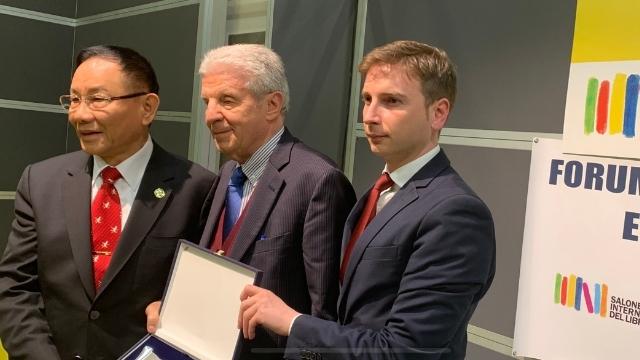What can we do about the Tai Ji Men case? Keep telling the truth about the legal and social injustice is a good starting point.
by Francesco Curto*
*A paper presented at the webinar “The Truth, Please, About the Tai Ji Men Case,” co-organized by CESNUR and Human Rights Without Frontiers on March 24, 2022, United Nations International Day for the Right to the Truth Concerning Gross Human Rights Violations and for the Dignity of the Victims.

I am an Italian attorney and the President of the Fedinsieme (“Faith Together”), a committee that is particularly active in intercultural and interreligious dialogue. In the past few years, I had the opportunity first to personally meet Dr. Hong at an event organized in Turin, and later to study the legal and fiscal problems Tai Ji Men have been experiencing for a long time, and attend some of the webinars.
Other members of Fedinsieme have also participated in previous webinars. They have praised Tai Ji Men for promoting the values of a society of peace, but have also noted that this is never easy because and normally meet with obstacles.
Sometimes, these obstacles are internal to the movements that deal with this issue. More often, they are external, i.e., they are determined by organizations or individuals who, for reasons pertaining to their ego and even to their lack of wisdom, implement mechanisms of contrast and resistance against those who promote peace.
In the case of Tai Ji Men, obviously these external mechanisms of contrast and resistance are at work. I previously spoke at a webinar on the Tai Ji Men case in October 2021, and used the expression “tax persecution,” even if I am aware that it is not a technical expression and is normally not used by lawyers.
Paying taxes is normal. Without them states would not survive. However, taxes need to be fair, equitable, and non-detrimental. In the case of Tai Ji Men and Dr. Hong, as mentioned in my previous paper and elaborated in the further study of the matter we conducted with other members of Fedinsieme, taxes are not fair, not equitable, and are detrimental, because what is being asked is not respectful of the fundamental principles of equality and consistency.
We celebrate today, March 24, the United Nations International Day for the Right to Truth About Gross Human Rights Violations and for the Dignity of the Victims. On this day we are called to remember and honor the victims of gross and systematic human rights violations and to promote the importance of the right to truth and justice.
In the Asia-Pacific region (and beyond) the failure of governments to address human rights issues has influenced the growth of movements of human rights defenders and activists. These movements have been a great inspiration for reforms that in some countries have occurred after many years of struggles. In other countries, however, the space for human right activism has been curtailed. The civil society and human rights defenders such as lawyers, journalists, and others, have found themselves the target of repression. There is much discussion about the problems freedom of expression encounters in China, the growing intolerance of dissent in Cambodia and Thailand, and the kidnapping or assassinations of human rights activists in Bangladesh and Pakistan.
In some countries, the impunity of the perpetrators of these crimes has become widespread, and has inevitably generated and sustained other violations, including more unlawful killings and torture, as well as denied justice and redress to thousands, if not millions, of citizens.
But the picture in the Asia-Pacific region is not bleak only. There is also a growing demand for the respect and protection of human rights. There are active movements. And there are significant, if tentative, results.
Tai Ji Men and Dr. Hong have been at the forefront of the effort to implement a genuine human rights education in the Asia-Pacific region and beyond. This is a respectable and ambitious goal. It must not cease. It must continue unabated, without being bothered and hampered by an unjust tax persecution.
I would like to say to Tai Ji Men dizi: happily, you have the strength to resist and the support of many, who see in the paradoxical situation you are experiencing clear signs of persecution and violation of rights.
We have the good fortune to live in societies where citizens can express their opinions and contribute, in various ways, to social progress, including through political and trade union activism or peaceful protest. Yet, we know that raising awareness is never easy.

The Tai Ji Men case asks all of us to confront the question of what we can do to help solving a very serious, and at the same time paradoxical, situation. I believe we all agree that the tax action against Dr. Hong and Tai Ji Men, should never have been initiated in the first place, or at any rate should have been solved long ago. This has not been the case, and today we are still here, still discussing the Tai Ji Men case after 25 years.
What can we do today, to honor March 24, the International Day for the Right to Truth About Gross Human Rights Violations and for the Dignity of Victims? What can we do, specifically, about the Tai Ji Men case?
This day is about truth, and what we can do is emphasize that the public opinion in Taiwan and elsewhere has a right to truth. We can raise our voice and tell the truth about what happened to Dr. Hong and Tai Ji Men. We can tell the truth about the unjust tax case, showing its legal contradictions. We can honor the dignity of those in Tai Ji Men who have suffered human rights abuses.
It is only in this way that we can affirm the truth that human rights are fundamental and inviolable.
Source: Bitter Winter

